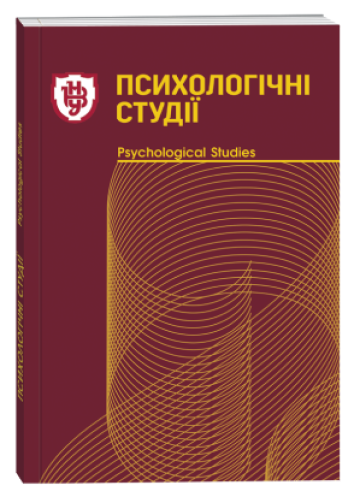ВПЛИВ ТРАВМАТИЧНОГО ДОСВІДУ ДИТИНСТВА НА ЯКІСТЬ ПРИВ’ЯЗАНОСТІ
DOI:
https://doi.org/10.32782/psych.studies/2023.3.11Ключові слова:
прив’язаність, поведінкові патерни, якість прив’язаності, травматичний досвід, травмаАнотація
У статті наведено теоретичний аналіз проблеми виникнення травматичного досвіду як наслідку недбалого поводження з дитиною з боку матері та батька. Базовим поняттям аналізу виникнення травматичного досвіду є прив’язаність. Підкреслено, що в сучасній психологічній науці прив’язаність розглядається як основне поняття, яке описує ставлення дитини до близького дорослого, яким у ранньому онтогенезі зазвичай є мати. У статті зазначено, що феномен прив’язаності дитини до матері знаходиться в центрі уваги дослідників як чинник якості людських взаємовідносин. Водночас прив’язаність має велике значення для формування ефективної материнської поведінки, пристосування дитини до навколишнього світу, її гармонійного розвитку. При цьому прив’язаність між немовлям та дорослим, що його доглядає, не є вродженою, а має сформуватися впродовж першого року життя дитини і визначається позицією матері, її здатністю до співпереживання та емоційної підтримки. Відповідно, цей час є визначальним і детермінуючим у формуванні прив’язаності різної якості (Ainswarth), яка надалі зумовлює розвиток пізнавальних, комунікативних, емоційних можливостей дитини, які безпосередньо впливатимуть на особливості її соціальної адаптації. У статті доводиться думка про те, що дитина має велику потребу в здоровій прив’язаності до матері. Серед чинників, які сприяють формуванню надійної прив’язаності, необхідними є комфорт та системне задоволення базових потреб. Відзначено, що неналежний догляд за дитиною, неадекватні реакції на її клич, холодність із боку мами, її байдужість здатні нанести психіці дитини серйозних емоційних порушень, навіть спричинивши переживання нею травматичного досвіду. На основі аналізу сучасних досліджень з’ясовано, що травма прив’язаності перетворюється на приголомшливий досвід відчуття самотності в ситуації нестерпного емоційного стану чи усвідомлення того, що сама прив’язаність є причиною величезного дистресу. Варто врахувати, що великі проблеми батьківського піклування емпірично пов’язані з численними несприятливими психосоціальними стресовими ситуаціями, наприклад, такими, як: важкий хронічний шлюбний конфлікт, перинатальна втрата попередньої дитини, дитина з обмеженими можливостями, післяпологова депресія/психоз, батьківська психіатрична захворюваність та насильницьке середовище.
Посилання
Крижановська З., Бабак К. Емоційна прив’язаність дитини до матері як предиктор її соціальної адаптації до шкільного життя. Психологічні перспективи. Луцьк, 2021. Вип. 38. С. 138–150. URL: https://evnuir.vnu.edu.ua/bitstream/123456789/20191/3/PP_38_2021-138-149.pdf
Bowlby J. Maternal care and mental health. In: The master work series, 2nd ed. Jason Aronson: Northvale, NJ, London (1950), 1995.
Bowlby J.A secure base: Parent-child attachment and healthy human development. New York : Basic Books. 1988. doi: 10.1038/embor.2012.191
Ainswarth M. Mary D. Salter Amsworth // O'Connell A., Russo N. (eds). Models of achievement leflections of eminent women in psychology. N Y., 1983. P. 200–219.
Ainsworth M. Attachments beyond infancy. Am Psychol. 1989. 44:709–6.
Allen J.G. Mentalizing in the development and treatment of attachment trauma. London : Karnac Books. 2013.
Affect regulation, mentalization and the development of the self / P. Fonagy et al. New York: Other Press. 2002.
Winnicott D.W. Primary maternal preoccupation. In: Mariotti P, editors. The maternal lineage: Identification, desire, and transgenerational issues. New York, NY: Routledge/Taylor and Francis Group, 1956. P. 59–61.
Winnicott D.W. The theory of the parent-infant relationship. Int J Psycho-Analysis. 1960. 41:585.
Stern D.N. The interpersonal world of the infant. A view from psychoanalysis and developmental psychology. New York : Basic Books, 1985.
Maternal oxytocin response predicts mother-to-infant gaze / S. Kim et al. Brain Res. (2014a) 1580:133–2.







